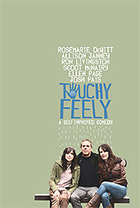Touchy Feely
|  The title of Lynn Shelton’s Touchy Feely would seem to connote a sense of sarcasm or jokiness, but everything about her new age dramedy suggests that we are meant to take it at face value, including the unexplained mystical changes that several characters undergo for no apparent reason other than to set the plot in motion. This confusion between the ostensibly sardonic tone of the title (really, when was anything good ever described as being “touchy feely?”) and the apparent genuineness with which we are meant to approach and understand the characters is the first hint at the movie’s general confusion and misguided sense of purpose. There are some wonderful moments scattered throughout and a fantastically awkward performance by Josh Pais, but otherwise Touchy Feely is something of a mess. The title of Lynn Shelton’s Touchy Feely would seem to connote a sense of sarcasm or jokiness, but everything about her new age dramedy suggests that we are meant to take it at face value, including the unexplained mystical changes that several characters undergo for no apparent reason other than to set the plot in motion. This confusion between the ostensibly sardonic tone of the title (really, when was anything good ever described as being “touchy feely?”) and the apparent genuineness with which we are meant to approach and understand the characters is the first hint at the movie’s general confusion and misguided sense of purpose. There are some wonderful moments scattered throughout and a fantastically awkward performance by Josh Pais, but otherwise Touchy Feely is something of a mess.The narrative presents us with an adult brother and sister, Abby (Rosemarie DeWitt) and Paul (Pais), who live in Seattle and are in every way polar opposites. Abby is a successful massage therapist who is deeply in touch with her body, as evidenced by her participating in reiki, a Buddhist spiritual practice involving the transfer of universal energy. Paul, on the other hand, acts like someone who isn’t comfortable in anything, much less his own body. A dentist whose inherited practice has dried up due to his refusal to promote or market it, he lives with his college-age daughter Jenny (Ellen Page), who nurses an ambition to go to culinary school, but feels compelled to stay home and help Paul by working as his dental assistant. While Paul is single, Abby is engaged in an escalating relationship with her boyfriend Jesse (Scoot McNairy), who works at a bike shop and is the very epitome of Seattle hipster cool. Abby and Paul effectively swap places in life when she inexplicably develops an aversion to the human touch (a real bummer for a massage therapist) while Paul inexplicably develops a mystical healing touch in which his patients suffering from the jaw disorder TMJ find themselves suddenly cured. Abby, distressed beyond words at her predicament, recoils into herself, cutting off her practice and breaking it off with Jesse (who had asked her to move in with him). Paul, whose waiting room is suddenly flush with new patients, develops a new sense of confidence, or at least enough to visit and then develop a relationship with Bronwyn (Allison Janney), the reiki guru who used to work on Abby. As with her previous films Humpday (2007) and Your Sister’s Sister (2011), Shelton is most interested in the complex details of interpersonal relationships, and the sporadic moments when Touchy Feely really works tend to coincide with graceful moments of subtle character revelation. There is one particularly memorable scene in which Jenny asks Jesse, on whom she has on obvious crush, to accompany her to a musical performance by Henry (Tomo Nakayama, lead singer of the Seattle music group Grand Hallway), who works as a barista and clearly has a crush on her. There is no dialogue, but the emotion emanating from Jenny, who is pining for Jesse, and Jesse, who is clearly missing Abby, as they sit and listen to Henry perform a beautiful acoustic version of Grand Hallway’s single “Horses” is palpable, and it carries over to the ensuing scene in which Jenny makes her feelings known and Jesse manages with grace and delicacy to be with her in the moment without encouraging her desire. It’s a profound moment of human tenderness that stands out because so much of the rest of the film feels so obviously contrived. There are also bits that are quite funny, especially the scenes involving Paul and his clumsy, quiet attempts to do … well, anything. Pais, a veteran character actor who turns up regularly in both Hollywood and indie productions, really nails the physicality of a man who feels perpetually uncomfortable; he walks not like he has a stick up his you-know-where, but rather a stick in just about every joint in his body. Yet, despite being perennially uptight, Paul is still eminently likable in a sad, bittersweet kind of way. That bittersweet quality also extends to Jenny, who leads her own life of quiet desperation. Unfortunately, when the film turns to Abby’s plight, it isn’t nearly as compelling or funny or moving; we certainly feel for her predicament, but it’s so weird and inexplicable that it’s hard to connect with her sense of loss. Paul’s sudden healing touch doesn’t make any sense either, but we feel for him as a character outside the mystical mumbo-jumbo with which he’s dealing. Abby, on the other hand, simply fades into the background until Shelton decides to just as inexplicably tie up all the loose ends and present us with a reunited family, each person comfortably in his or her place ostensibly because of what they have gone through. The problem is that Shelton doesn’t fully dramatize the transition, so we’re left with a sense of deus ex machina, which doesn’t sit well with a film that in which character is supposedly paramount. Copyright ©2013 James Kendrick Thoughts? E-mail James Kendrick All images copyright © Magnolia Pictures |
Overall Rating: 
 (2)
(2)


